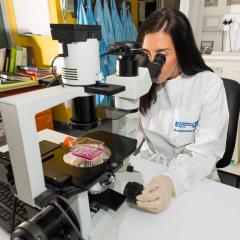Dementia research at QBI
Dementia research at the University of Queensland ranges from understanding the basis of the disease, through to treatments and developing better care options.
Ultrasound treatment
Led by Professor Jürgen Götz, scientists at QBI’s Clem Jones Centre for Ageing Dementia Research (CJCADR) are developing a non-invasive ultrasound technology to treat Alzheimer’s disease and restore memory. The approach temporarily opens the blood-brain barrier, activating mechanisms that clear toxic protein clumps, and restoring memory functions. Research has been conducted in mouse models and is being scaled up in higher animal models. This breakthrough research is bringing hope to the hundreds of thousands of Australians currently living with the illness.
The research undertaken by CJCADR investigates, at a biochemical, molecular, behavioural, electrophysiological and histological and systems level, how ageing dementia causes neurodegeneration as well as the decline of memory and also, motor functions. This is complemented by studies into physiological ageing. The Centre uses as experimental systems mainly tissue culture cells and genetically modified mice and worms.
Exercise
Exercise may be an effective way of decreasing the risk of cognitive decline. QBI Founding Director Professor Perry Bartlett successfully used exercise to improve cognition in older mice. He is now leading the clinical trial, along with Dr Mia Schaumberg, from the UQ School of Human Movement and Nutrition Sciences, to find the amount, intensity, and type of exercise that might lead to cognitive improvement in elderly people. It’s thought that exercise boosts the production of new neurons in the brain, which might improve cognition. Ultimately, the aim is to have clear public health guidelines as to how exercise can both prevent and reverse dementia. qbi.uq.edu.au/exercise-study
Cognitive neurobiology
Professor Peter Nestor is a clinician-scientist and joined the Queensland Brain Institute in October/2017. He also has a conjoint appointment at Mater Misericordiae Ltd (Mater Hospital).
He aims to relate the neuropsychological and behavioural profiles of degenerative dementias, such as Alzheimer's disease and frontotemporal dementia, to regional brain damage through neuroimaging (MRI and PET) and histopathological analysis. His particular interest is the pathological landscape of incipient dementia (so-called mild cognitive impairment).
By studying patients in this category he hopes to develop a greater understanding of the regions of highest vulnerability to neurodegeneration in different pathologies. Identification of such regions may potentially lead to a better understanding of what makes these regions vulnerable in the first place. His research ultimately aims to improve diagnostic certainty and prognostic markers of decline - both of which are relevant to therapeutic development.
To this end, a major focus of his is on developing novel approaches to MR imaging for single subject pathological diagnoses that can be exported into the everyday clinical setting; this has included to date diffusion imaging (Sajjadi et al, 2013) and quantitative susceptibility mapping (Acosta-Cabornero et al, 2013).
Immunotherapy
CJCADR is pursuing new strategies to reduce the burden of dementia. This includes the development of therapeutic antibodies. A major aim is the discovery of interventions to delay the onset, prevent and even cure dementia in patients, using novel drugs and better methods to deliver them to the brain. Another aim is the development of biomarkers to diagnose dementia earlier, more cheaply and with greater accuracy, and to monitor therapeutic interventions. Finally, lifestyle strategies will be formulated for maintaining a healthy brain.
Sleep apnoea
People who suffer from sleep apnoea are two to three times more likely to develop Alzheimer’s disease, says Professor Elizabeth Coulson, from the Queensland Brain Institute and the School of Biomedical Sciences at UQ.
“This could be because hypoxia – lower levels of oxygen in the blood from poor breathing – causes nerve cell death,” she says.
Prof Coulson’s team is beginning a study that will follow patients aged 55 to 75 with sleep apnoea over an extended period, to determine whether using a continuous positive airway pressure (CPAP) ventilator, which keeps airways open during sleep, protects against brain degeneration and lowers the risk of dementia. qbi.uq.edu.au/sleepapnoeastudy


